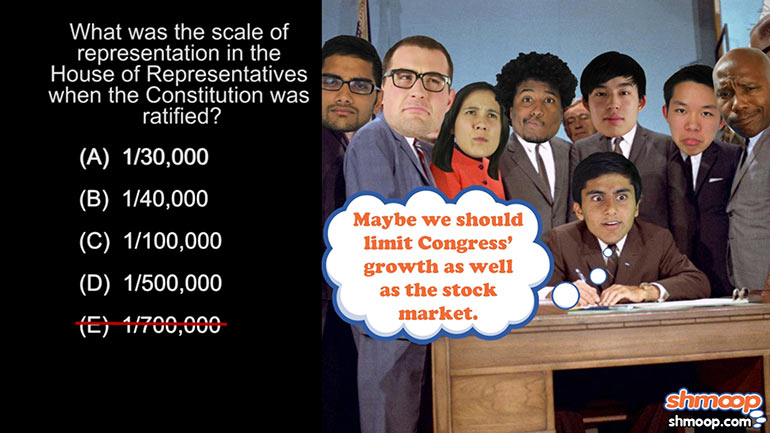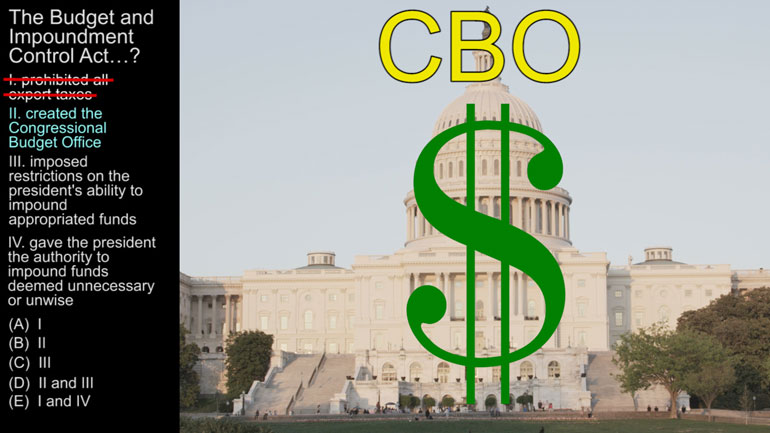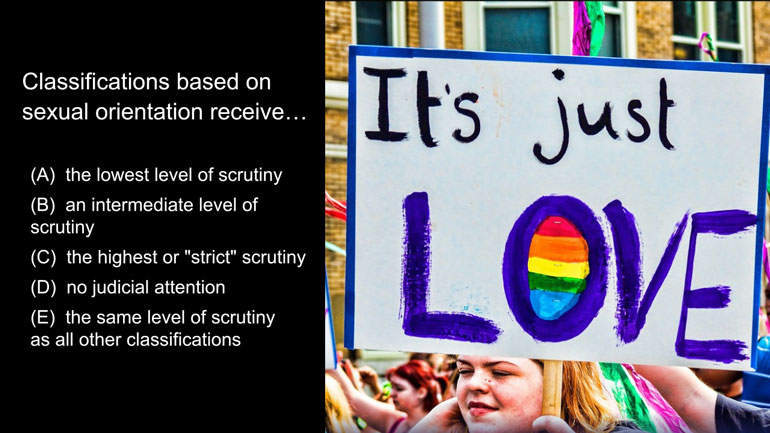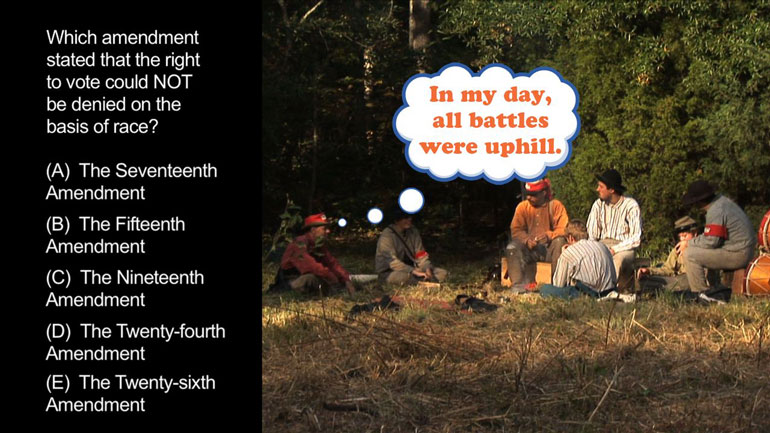ShmoopTube
Where Monty Python meets your 10th grade teacher.
Search Thousands of Shmoop Videos
AP U.S. Government 2.3 Institutions of National Government 224 Views
Share It!
Description:
AP U.S. Government 2.3 Institutions of National Government. In what case did the Supreme Court first rule a state action unconstitutional, thereby strengthening its power of judicial review?
Transcript
- 00:00
Thank you We sneak and here's your shmoop du jour
- 00:05
brought to you by judicial review the all night study
- 00:09
sash for first year law students In what case did
- 00:12
the supreme court first rule a state action unconstitutional thereby
- 00:17
strengthening its power of judicial review and hear the potential
Full Transcript
- 00:21
answers Okay here we go Well the constitution's framers laid
- 00:27
down some pretty strict rules for setting up parts of
- 00:30
the new government But when it came to the judicial
- 00:32
branch they courted a less specific approach Not only did
- 00:36
the framers leave it to congress to set up most
- 00:39
of the court system they also gave those courts permission
- 00:41
to set many of their own powers including judicial review
- 00:46
the ability to strike down laws they believe to be
- 00:49
unconstitutional Did the supreme court first rule a state action
- 00:54
unconstitutional in a marbury versus madison Well marbury v madison
- 00:59
was all about appointments No not the doctor kind but
- 01:02
rather judicial appointments All right Well long story short John
- 01:05
adams wanted to appoint a bunch of federalist judges to
- 01:09
the court as a sort of screw you to thomas
- 01:12
jefferson the democratic republican who would soon be assuming the
- 01:15
presidency But jefferson caught onto adam's court packing plan so
- 01:19
he and secretary of state james madison refused to deliver
- 01:23
marbury His official appointment papers Even the case got its
- 01:27
name Yeah well marbury got in a tizzy about the
- 01:30
whole thing and went to the supreme court hoping for
- 01:32
a favorable ruling from fellow federalist and now chief justice
- 01:36
john marshall Well marshall had other plans He ruled that
- 01:40
parts of the judiciary act of seventeen eighty nine a
- 01:43
law passed by congress giving the supreme court the ability
- 01:45
toe weigh in on cases like marbury's were actually unconstitutional
- 01:50
The marbury v madison was in fact a landmark case
- 01:53
for judicial review But at the national level not the
- 01:56
state Did the supreme court first find a state action
- 02:00
unconscious stick to sh inal in be little v bar
- 02:03
eam wel l v b was all about a little
- 02:07
misunderstanding You see congress passed a law that said that
- 02:10
navy could seize any vote that was sailing to a
- 02:13
french port Since we were in a quiz i war
- 02:16
with france at the time No really that's what It
- 02:18
was called Go look it up President john adams didn't
- 02:21
think that law was strong enough So he ordered the
- 02:23
navy to seize ships sailing to and from any french
- 02:27
port That's How Captain little got swept up into the
- 02:30
sea change of judicial affairs He was sailing from a
- 02:33
french port and his appeal the supreme court led to
- 02:35
adam's Being found in the wrong sensing a pattern here
- 02:39
So little veba dream was the first time the supreme
- 02:42
court held an executive action not a state action to
- 02:47
be unconstitutional All right well did the supreme court first
- 02:50
exercise judicial review against the state law Indeed gibbons v
- 02:54
ogden i will gibbons and ogden were two folks bickering
- 02:57
over who held the rights to operate a steamboat between
- 03:01
new jersey and new york city Sounds little wishy washy
- 03:04
tow us Ogden held the license for the route that
- 03:07
was issued by the state of new york Gibbons obtained
- 03:10
his license from the u s congress Well the supreme
- 03:13
court ruled in favor of gibbons saying that the u
- 03:16
s had authority over the states when it came to
- 03:18
regulating commerce between two states but that's more about federal
- 03:23
supremacy over states not a specific state law Yeah it's
- 03:27
kind of tricky What about ian mccullough Free maryland Essentially
- 03:31
the state of maryland tried to mess with a branch
- 03:32
of the u s national bank by imposing a tax
- 03:35
on any bank that wasn't chartered in maryland What kind
- 03:37
of funny money businesses that well even though the constitution
- 03:40
doesn't give congress the express clear power to establish a
- 03:44
bang It does give congress the power to tax and
- 03:47
spend and what we need to tax and spend Well
- 03:50
well bank on uh a bank for that The constitution
- 03:54
also states that federal laws have supremacy over state laws
- 03:57
So the supreme court ruled that this particular state act
- 04:00
was not an act of kindness But this case was
- 04:02
more about increasing congress implied powers than overruling a state
- 04:07
law which means that the supreme court first ruled a
- 04:10
state action unconstitutional in see fletcher be peck fletcher be
- 04:14
peck had to do with a not so peachy land
- 04:17
transaction way down in georgia in seventeen ninety five the
- 04:20
state of georgia sold a bunch of territory under the
- 04:23
yazoo land act Later on though it was revealed that
- 04:26
lawmakers passed the yazoo land act in exchange for bribes
- 04:30
So the new legislature decided to repeal the law in
- 04:34
void all the contracts of people who had purchased land
- 04:37
in the transaction Now fletcher bought a tract of land
- 04:40
from pac The peck had gotten through the seventeen ninety
- 04:42
five act But once the law was repealed both of
- 04:45
them landed in oil Quite a pickle The supreme court's
- 04:48
ruled in the eighteen ten case that the act of
- 04:51
georgia lawmakers to repeal the yazoo land act was unconstitutional
- 04:56
It voided the sanctity of a sale guaranteed under the
- 04:59
contract clause of the constitution O c Is that contractually
- 05:03
correct answer with all these cases john marshall firmly established
- 05:06
the supreme court's power of judicial review ensuring that justice 00:05:10.514 --> [endTime] would be served at any level
Up Next
AP U.S. Government 1.1 Institutions of National Government. What was the scale of representation in the House of Representatives when the Constitut...
Related Videos
AP U.S. Government 2.2 Public Policy. What did the Budget Impoundment Control Act do?
AP U.S. Government 2.3 Civil Rights and Liberties. Classifications based on sexual orientation receive...what?
AP U.S. Government 1.3 Political Beliefs and Behaviors. What sort of poll would you commission to monitor popularity over three months?
AP U.S. Government 2.3 Constitutional Foundations. Which amendment stated that the right to vote could not be denied on the basis of race?




